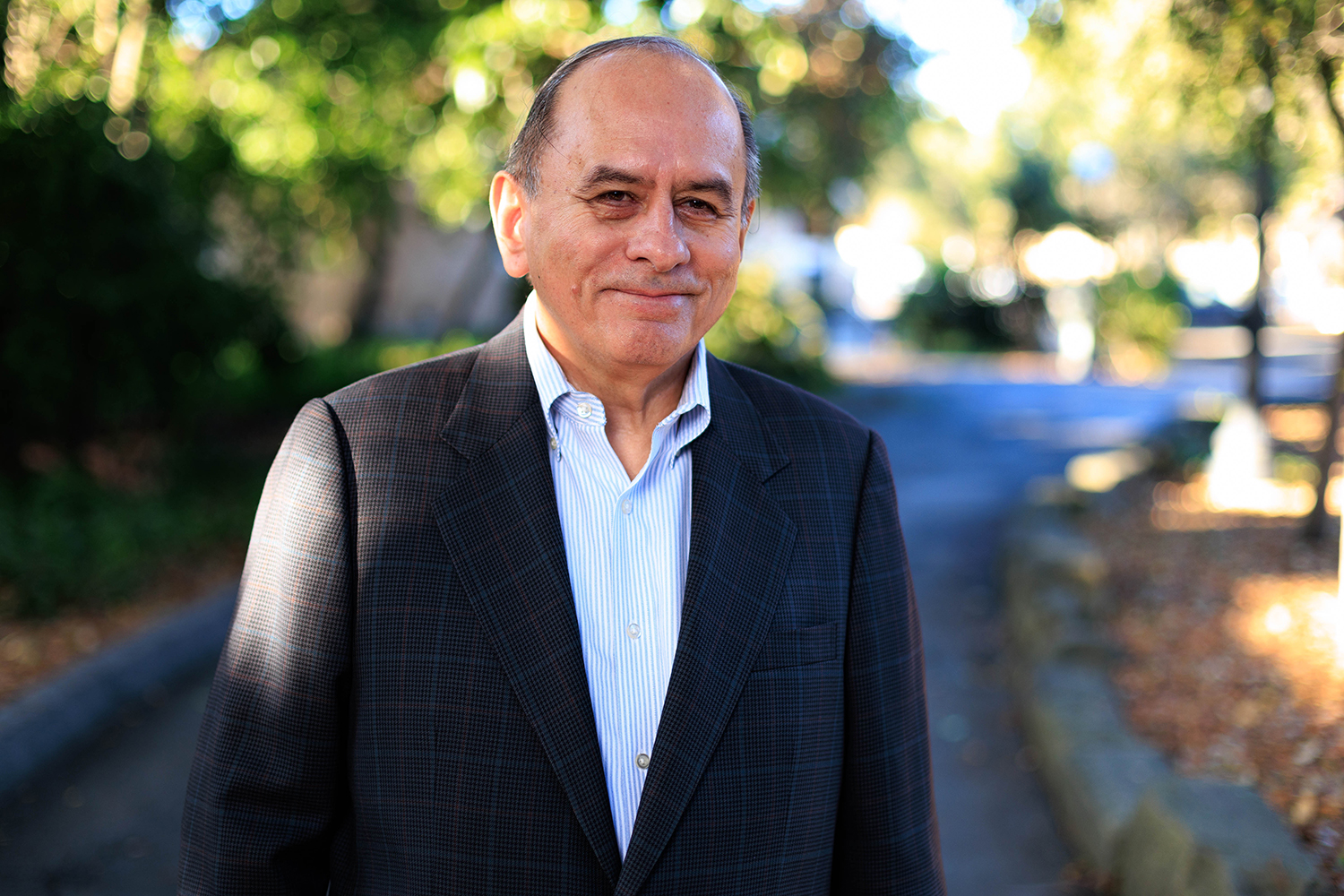
Matt Snipp is currently serving as interim vice provost for student affairs. (Image credit: Nikolas Liepins / Ethography)
On one of the walls behind his desk, Matt Snipp has a framed painting by Navajo Nation artist R.C. Gorman, a cherished piece and a reflection of his love for American Indian art. On the other, a poster promoting the 1990 Census, a nod to his research, his role as a demographer, and the 10 years he served as an appointed member of the Census Bureau’s Racial and Ethnic Advisory Committee.
Snipp, the first in his family to graduate college and now a professor of sociology in the School of Humanities and Sciences and the vice provost for faculty development, diversity, and engagement, has taught and led at Stanford for nearly 30 years, even raising his children on campus while serving as a resident fellow at Murray House. In January, he began his role as interim vice provost for student affairs.
Snipp, the Burnet C. and Mildred Finley Wohlford Professor, recently shared more about his connection to students, faculty, and the university, and the values driving his leadership.
How does the experience of students today reflect the experiences you had as a student?
I have tremendous respect for student leaders and for their commitment to social justice. In my experience and observation, really important changes often come about through higher education and student activism. You can look at the free speech movement that took place at Berkeley and eventually spread across the country or the anti-Vietnam War effort. But also the movement to establish ethnic studies programs, which came about as a result of student activism, starting just up the road at San Francisco State. More recently, we have the Center for Comparative Studies in Race and Ethnicity, which represents the second generation of ethnic studies. So, I think students have always taken an active role in shaping their education.
“In my experience and observation, really important changes often come about through higher education and student activism.”
How do you see your experience as a faculty member contributing to this interim role in administration? In what ways are the two connected?
As a faculty member, especially at a place like Stanford, it’s a privilege to have the opportunity to work with incredibly talented, idealistic, committed individuals who, almost always without exception, are going to go on and change the world. To the extent that I can provide some knowledge and guidance and maybe a little advice along the way, it’s really a privilege to have that opportunity. I currently serve as the vice provost for faculty development, diversity, and engagement within the Office of Faculty Development, Diversity and Engagement, which is a very different kind of mission, because we’re really dedicated to the faculty’s success. Although, at the same time, in Student Affairs, we’re also dedicated to student success. So, while it’s a different set of conditions and circumstances than we think about when we talk about faculty success, in some ways, it’s similar.
What values do you bring to your work, and where do you see alignment with your values and those of the office of the Vice Provost for Student Affairs and the university?
I generally assume that everybody here wants to do the right thing. And you can’t always say that for a lot of jobs and a lot of other industries. But I think in higher education, and particularly here at Stanford, people show up at this place, and they do their work because they want to do the right thing. Now, what the right thing is can be the subject of an awful lot of disagreement and contention in some cases. But, you know, at the bottom of everybody’s heart, I really assume that they want to do the right thing and that they’re acting out of good intent. And, for the most part, I haven’t been proven wrong about that very often.
“At the bottom of everybody’s heart, I really assume that they want to do the right thing and that they’re acting out of good intent. And, for the most part, I haven’t been proven wrong about that.”
What motivates you?
I have the best job in the world. Being a professor may not be the best job for everybody, but you have an enormous amount of independence and autonomy to spend your time studying and teaching about the things that interest you. I used to ask myself, “Would I rather be doing something else, somewhere else?” and the answer to that question was always “no.”
What do you see as higher education’s most pressing issues at the moment? How about here at Stanford?
I think higher education across the country is facing a legitimacy crisis. I think the value that American society places on higher education has seriously eroded over the past 20 or 30 years, maybe longer than that. And where I think we’re headed is that you’re seeing a small number of public universities who are moving away from public investment and moving away from their dependence on taxpayer support to a model where they’re essentially private universities. And that raises the potential of just continuing to exacerbate the inequality that exists in American society. In terms of students, mental health issues are an ongoing crisis, and not just Stanford. It’s something that Stanford shares with lots of institutions. I think the kind of existential angst of everyday student life is a source of incalculable stress and demand on young people today that didn’t exist 20 or 40 years ago.
What do you want students, faculty, and staff to know about you as a leader?
I love what I’m doing, and I have enormous respect for the people I work with, including faculty, staff, and students. And I’m always willing to listen. I can’t promise that I’ll agree, but I’ll listen.